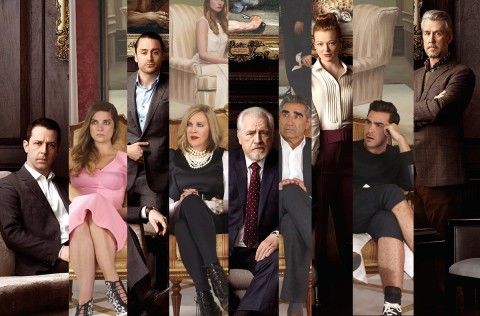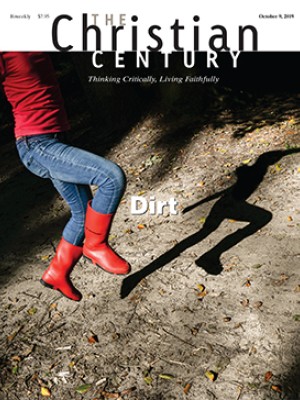(De)formed by wealth in Succession and Schitt’s Creek
Is there any redemption for the Roy family or the Rose family?

The behavior of the über-wealthy has always been a source of fascination in American culture. That fascination has often included a suspicion that wealth deforms and corrupts people. As wealth disparity reaches new heights and the middle class shrinks, this combination of fascination and wariness may be peaking. Two recent TV shows, Succession and Schitt’s Creek, suggest there’s also a longing to imagine a world without the structures of power that allow great wealth disparities in the first place.
Succession (now in its second season on HBO) follows the fictional Roy family as they jockey for power inside a massive global media and entertainment conglomerate called Waystar Royco, (clearly based on News Corp/Fox News), founded by the patriarch Logan Roy (Brian Cox). His four adult children fight each other for his love and for power in the company, which seem to amount to the same thing in this family.
Read our latest issue or browse back issues.
Each character is a unique moral mess, unable to escape from the bubble of wealth and power that has cushioned their lives. Kendall (Jeremy Strong), the heir apparent, can almost glimpse how badly he has been twisted by his father, but he does not know any other life and cannot imagine walking away from it. The only daughter, Shiv (Sarah Snook), tries to leave the family business for a life in politics but is slowly pulled into her father’s empire when she realizes how little power she has outside the family. Their younger brother, Roman (Kieran Culkin), is an arrogant gadfly whose desire for power is in inverted proportion to his qualifications to hold it. And the oldest son by a first marriage, Connor (Alan Ruck), may be the most viperous of all, feigning spiritual aloofness from the family business while sabotaging his siblings at every turn.
The Roy children are deformed in part because they have a power-hungry father who has made backstabbing a familial love language. But they are also deformed because they manipulate the economic and political prospects of so many people while genuinely having no sense of the daily struggles that occupies those people’s lives. They sway votes, elect presidents, shape the news, and project their petty wounds into world politics, but the few times they interact with “ordinary people” they come across as openly cruel or culpably clueless.
Watching the show is like pulling back the curtain at Oz and realizing that the wizard consists of a bunch of morally stunted children whose tantrums are destroying the democratic process and contributing to ecological apocalypse. The performances are so compelling it is hard to look away, but the effect is like watching a car crash you are somehow also involved in.
Sometimes cruel and often clueless also describes the fictional family on the magnificent Canadian comedy Schitt’s Creek (the sixth season will land on Netflix in January). The Rose family has also lived in a bubble of wealth and privilege, but the premise of the show is that they’ve lost their fortune and have been forced to move to a small town called Schitt’s Creek, a town the parents bought as a joke bequest to their spoiled children.
The first season features a lot of silly gags about the Roses’ cluelessness (“Dad, I didn’t use money to buy these clothes! I just used the credit card!”) and their utter despair at ending up among yokels who don’t know the difference between a good pinot noir and a local “fruit wine.”
But slowly the show morphs into a gentle exploration of moral growth through engagement with the community. They partner with the local motel, open a small pharmacy and beauty business which employs and serves their neighbors, and actually make friends. Where Succession thrives on scathing despair, Schitt’s Creek is gently hopeful.
The hope emerges as the show becomes more focused on the strange, beautiful ecosystem of the town. The rural location allows the show to explore the alternative economies that rise up in places abandoned by industry or investment. Schitt’s Creek has stopped playing by corporate rules because it has been abandoned to “failure.” Almost everyone works multiple jobs and supports each other through an informal economy of trading favors and labor. Everyone is technically poor, but no one lives in want. As the series goes along, it’s less about class difference and more about a place where community welfare flourishes outside traditional systems of power.
Of course, this vision requires the Roses to throw their lot in with those abandoned by the powerful, which is something like a camel going through the eye of a needle. The Roses might not enter the kingdom of heaven, but they do get a second chance at being decent humans. Given the alternatives seen in Succession, this almost seems like salvation.
A version of this article appears in the print edition under the title “(De)formed by wealth.”







